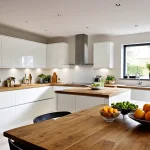Eco-Friendly Kitchen Technology: Shaping Modern UK Homes
Eco-friendly kitchen technology is rapidly transforming UK homes by prioritising sustainability without sacrificing convenience. Modern UK sustainable kitchens embrace innovations that significantly reduce environmental impact while enhancing energy efficiency. Smart appliances, for instance, optimise energy use by adapting to household patterns, cutting down electricity consumption.
Sustainability in domestic spaces isn’t just a trend; it reflects growing awareness of resource conservation. The kitchen, often the heart of a home, is central to this shift. Incorporating water-saving faucets, induction hobs, and energy-efficient refrigerators are common upgrades in green home innovations, helping households reduce carbon footprints and utility bills.
In parallel : What influence do cultural shifts have on UK kitchen aesthetics?
UK homeowners increasingly favour materials and devices that support longevity alongside sustainability. Examples include biodegradable packaging for food storage and appliances made from recyclable components. These technologies are not only eco-responsible but practical, aligning with the lifestyle demands of modern families.
By adopting eco-friendly kitchen technology, UK sustainable kitchens balance functionality with ecological conscience, leading the way towards greener, smarter homes. Such developments demonstrate that going green in the kitchen is both achievable and beneficial for daily living.
Topic to read : How are UK homeowners personalizing their kitchen spaces with unique finishes?
Key Eco-Friendly Technologies Used in UK Kitchens
Eco-conscious UK households are increasingly adopting energy-efficient appliances to reduce energy consumption. Modern fridges, ovens, and dishwashers use advanced technology to consume less electricity while maintaining high performance. These appliances often carry energy ratings that help consumers choose models that significantly cut down utility bills and environmental impact.
Alongside this, water-saving devices are becoming essential in kitchen design. Innovative taps with flow restrictors, dual-flush systems in dishwashers, and smart leak detection help minimize water waste. These solutions not only conserve water but also contribute to lowering water bills, aligning with sustainable living goals.
Sustainability extends beyond appliances to the materials used in kitchens. Cabinets and countertops increasingly feature recycled and sustainably sourced materials, such as reclaimed wood and bamboo. These choices reduce deforestation and waste, offering eco-friendly alternatives without compromising durability or style.
By integrating these technologies, UK kitchens not only become greener but also more cost-effective and practical for daily use—a win for both the environment and homeowners.
Environmental Impact and Benefits
Understanding the environmental benefits of robot hoovers reveals their role in enhancing kitchen sustainability and reducing overall carbon footprint. These devices operate efficiently, using less electricity than traditional vacuum cleaners, which translates into a tangible reduction in carbon footprint for households. Their focused cleaning patterns minimize resource wastage, ensuring energy and water used during cleaning is optimized.
Moreover, robot hoovers contribute to lowering household utility bills by consuming less power. This efficiency aligns with practical budgeting and supports sustainable living without compromising cleanliness. The consistent maintenance that robot hoovers provide also reduces the need for deep cleans, which often demand more energy and water, reinforcing kitchen sustainability efforts.
On a broader scale, widespread adoption of efficient home cleaning technologies like robot hoovers helps the UK move closer to its environmental targets. By diminishing electrical consumption in homes, they aid in reducing national reliance on fossil fuels, thus lessening greenhouse gas emissions. Integrating robot hoovers into routine cleaning practices is a small yet impactful action supporting both individual and collective carbon footprint reduction goals.
Practical Examples and User Experiences
Real-life UK case studies showcase how practical eco-friendly kitchen ideas can transform homes. One notable example involved a London household that installed energy-efficient appliances and reused greywater for plants. This approach reduced their water usage by 30% and cut electric bills by almost 20%. Such data clearly highlights the efficiency gains from adopting eco-friendly technology.
In another instance, a kitchen retrofit in Manchester featured solar water heating and LED lighting. Over a year, the household saved approximately £150 on utilities. These consumer feedback points confirm that sustainable upgrades are not just environmentally responsible but also economically savvy.
Users frequently report improved daily life thanks to quieter, smarter devices and overall better air quality. However, challenges include the initial investment cost and occasional maintenance of new systems. Feedback suggests that while some adjustments are needed, the benefits outweigh inconveniences for most.
This evidence-backed experience underscores the value of embracing practical eco-friendly kitchen ideas. Consumers keen to learn more about implementing these solutions can explore additional guidance at .
Current Trends and Future Direction in UK Kitchen Sustainability
In the UK, green kitchen trends focus increasingly on energy efficiency and resource conservation. Homeowners now prioritize appliances that reduce electricity and water consumption, reflecting a broader shift toward sustainable living. The rising adoption of smart kitchen technology plays a vital role by optimizing energy use and minimizing waste. For instance, smart fridges can adjust cooling based on contents, while sensor-equipped taps reduce unnecessary water flow.
Integration of smart home systems enables seamless control over kitchen functions, improving both convenience and eco-friendliness. These technologies allow users to monitor their energy consumption in real time, empowering informed and sustainable choices. Additionally, materials with low environmental impact, such as recycled surfaces and sustainably sourced wood, further contribute to reducing a kitchen’s carbon footprint.
Looking ahead, the future of eco-kitchens in the UK promises even greater innovation. Expect advancements like AI-powered cooking advisors and fully integrated renewable energy systems. As awareness grows, sustainable kitchen design will evolve from niche to norm, driven by technological progress and consumer demand for greener lifestyles. This momentum places eco-kitchens at the forefront of the UK’s broader sustainability goals.
UK Government Initiatives and Incentives for Sustainable Kitchens
The UK government actively promotes sustainable kitchens through various incentives aimed at reducing environmental impact. Homeowners looking to adopt eco-friendly solutions can benefit from government eco schemes designed to support greener home renovations. These initiatives often include grants, tax relief, and rebates that make sustainable kitchen upgrades more affordable.
For example, specific kitchen renovation grants may cover the installation of energy-efficient appliances, water-saving fixtures, and eco-friendly materials. These financial supports help offset the initial costs of switching to greener options, encouraging wider adoption. Additionally, some schemes prioritize insulation and renewable energy integration, which indirectly benefit kitchen areas by reducing overall household energy use.
To access these UK sustainability incentives, individuals should first explore official government portals which provide detailed guidance on eligibility and application processes. Local councils may also offer additional support through regional programs. Leveraging these resources can significantly ease the financial burden and facilitate a smooth transition to a kitchen that aligns with sustainability goals. Understanding and utilizing these schemes empowers homeowners to make informed decisions about eco-friendly kitchen renovations.

